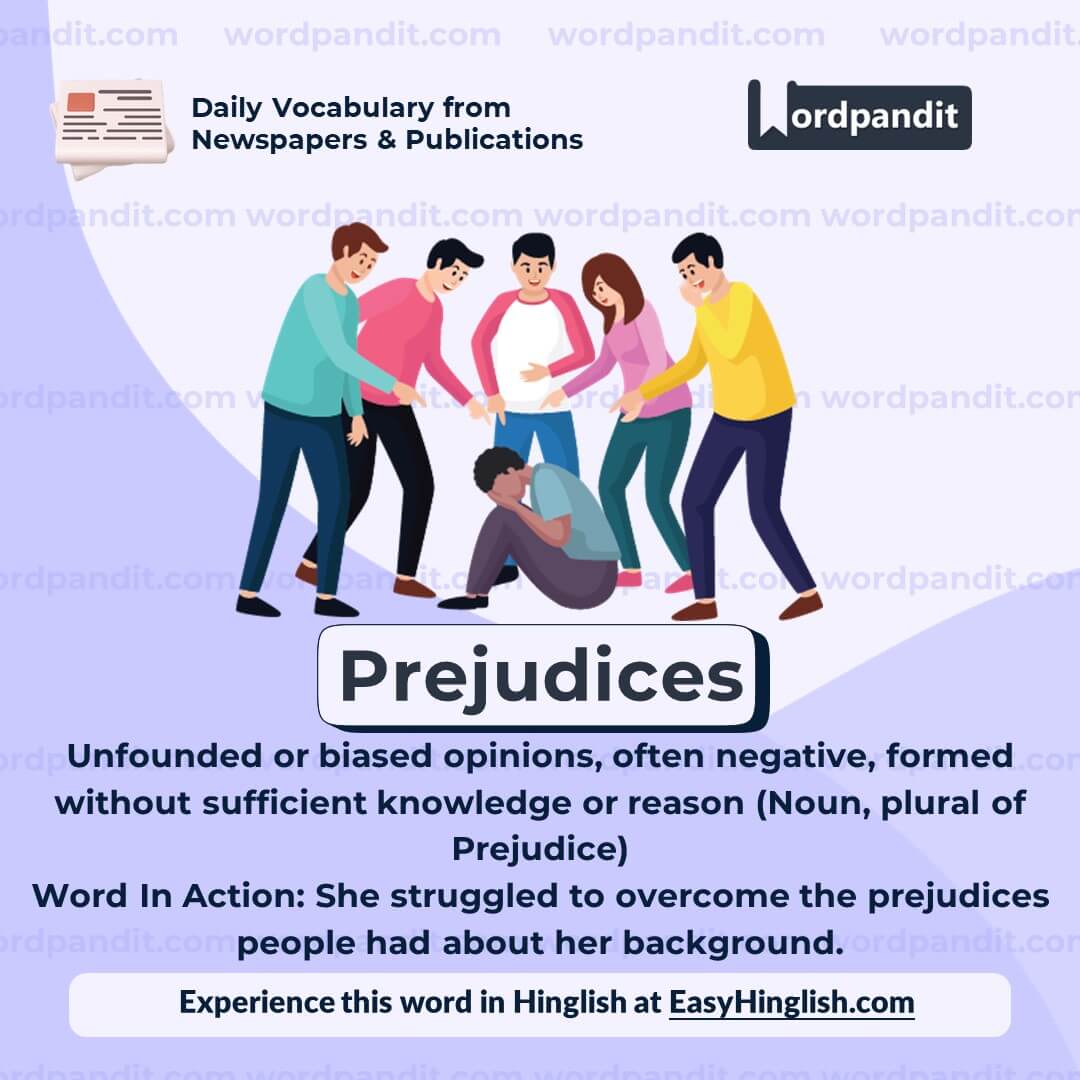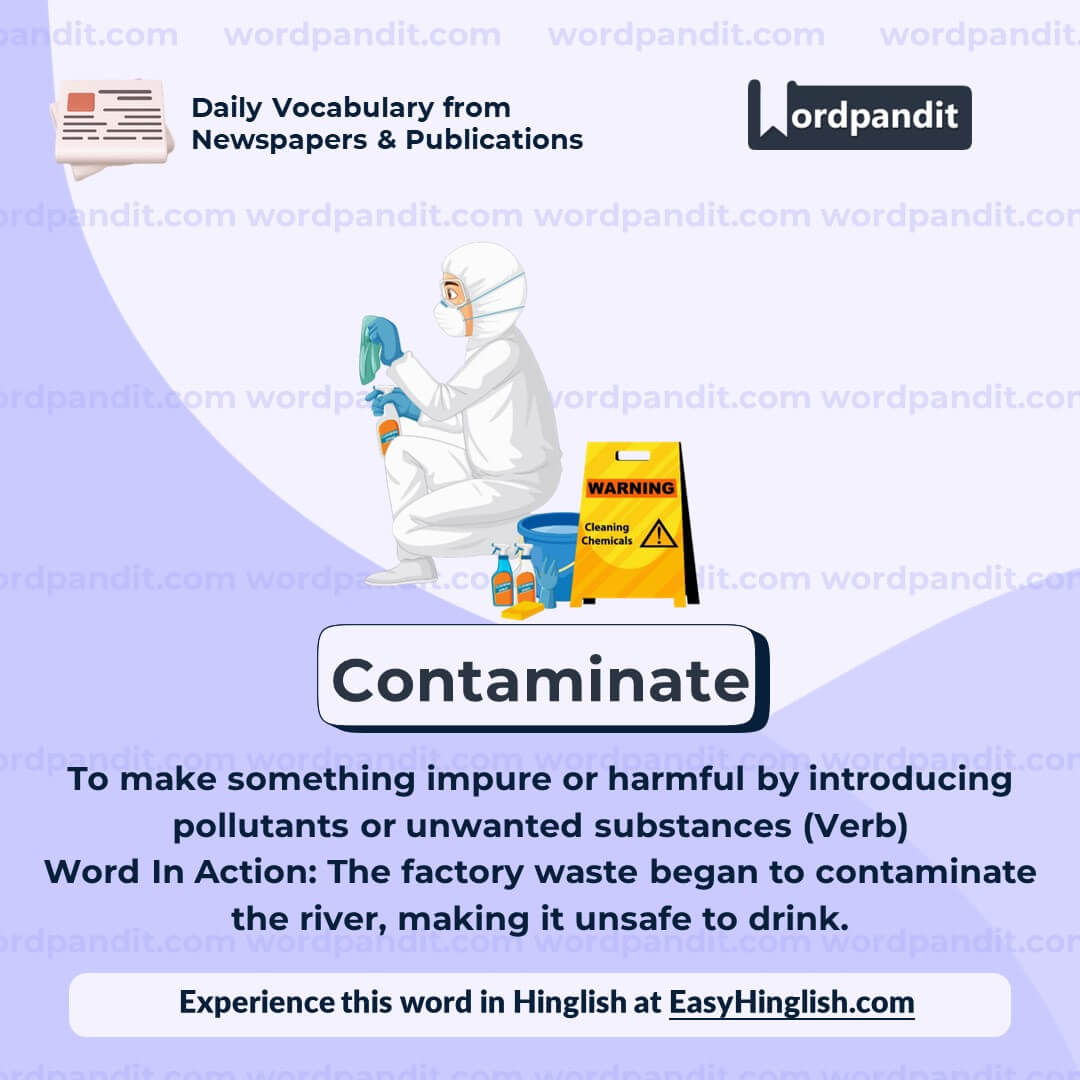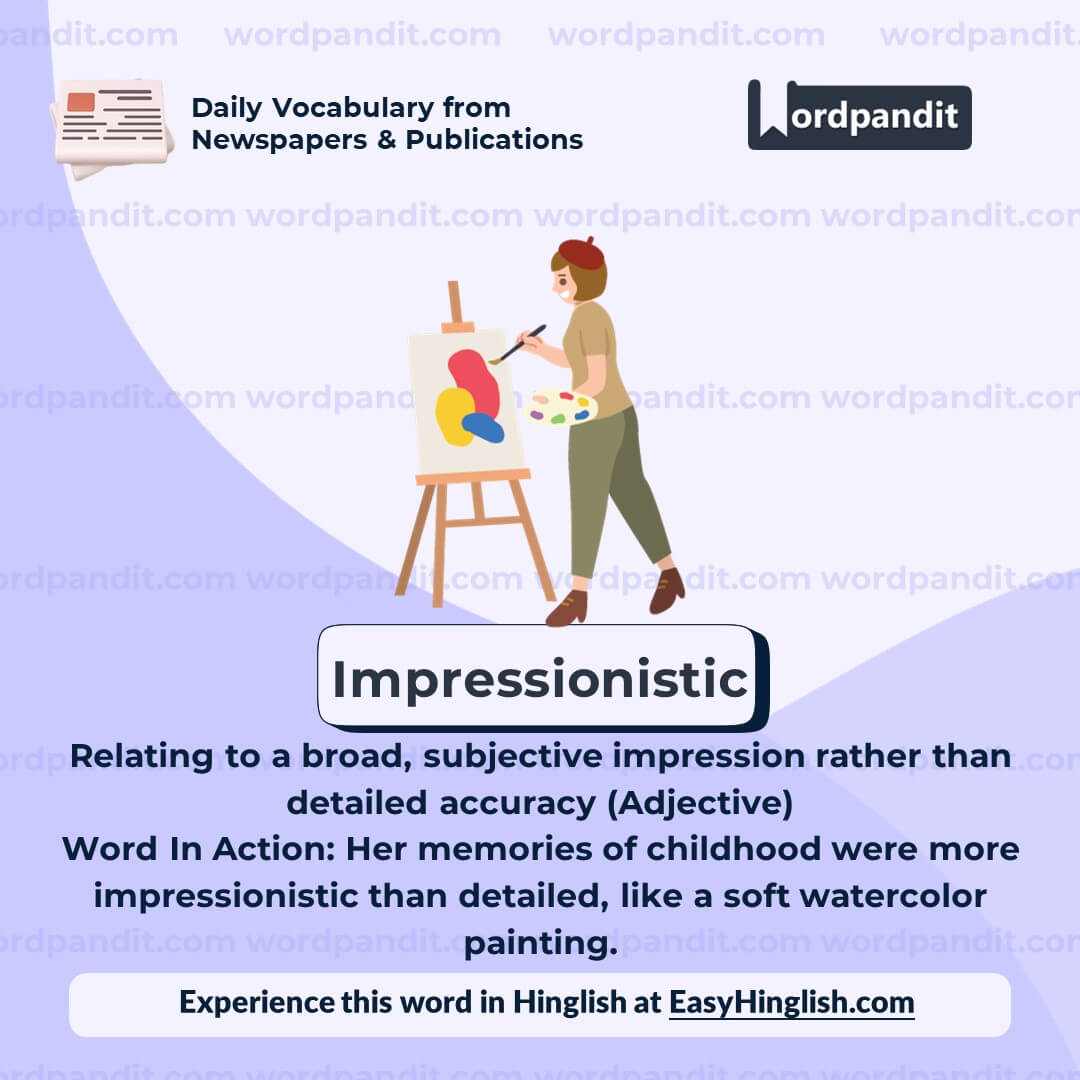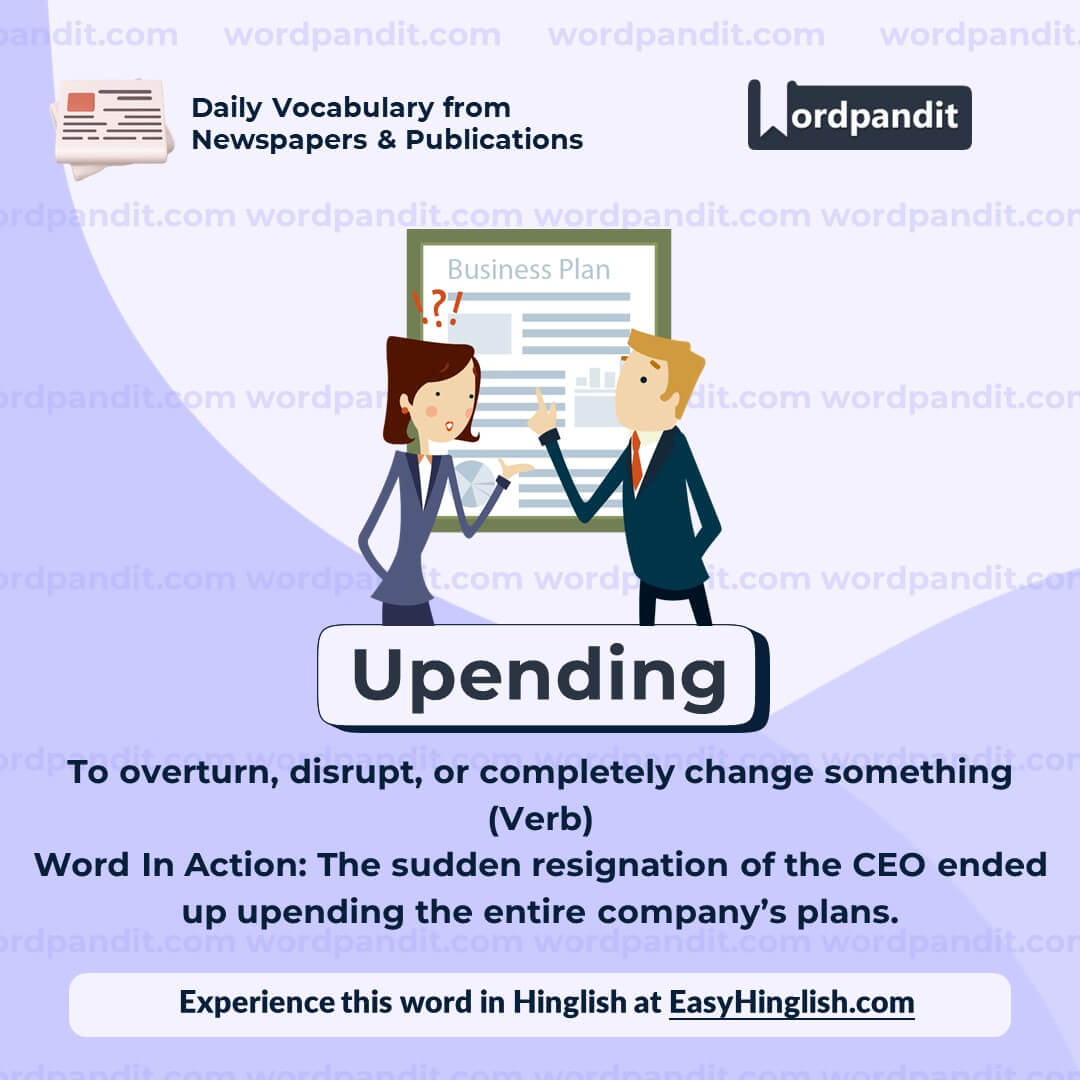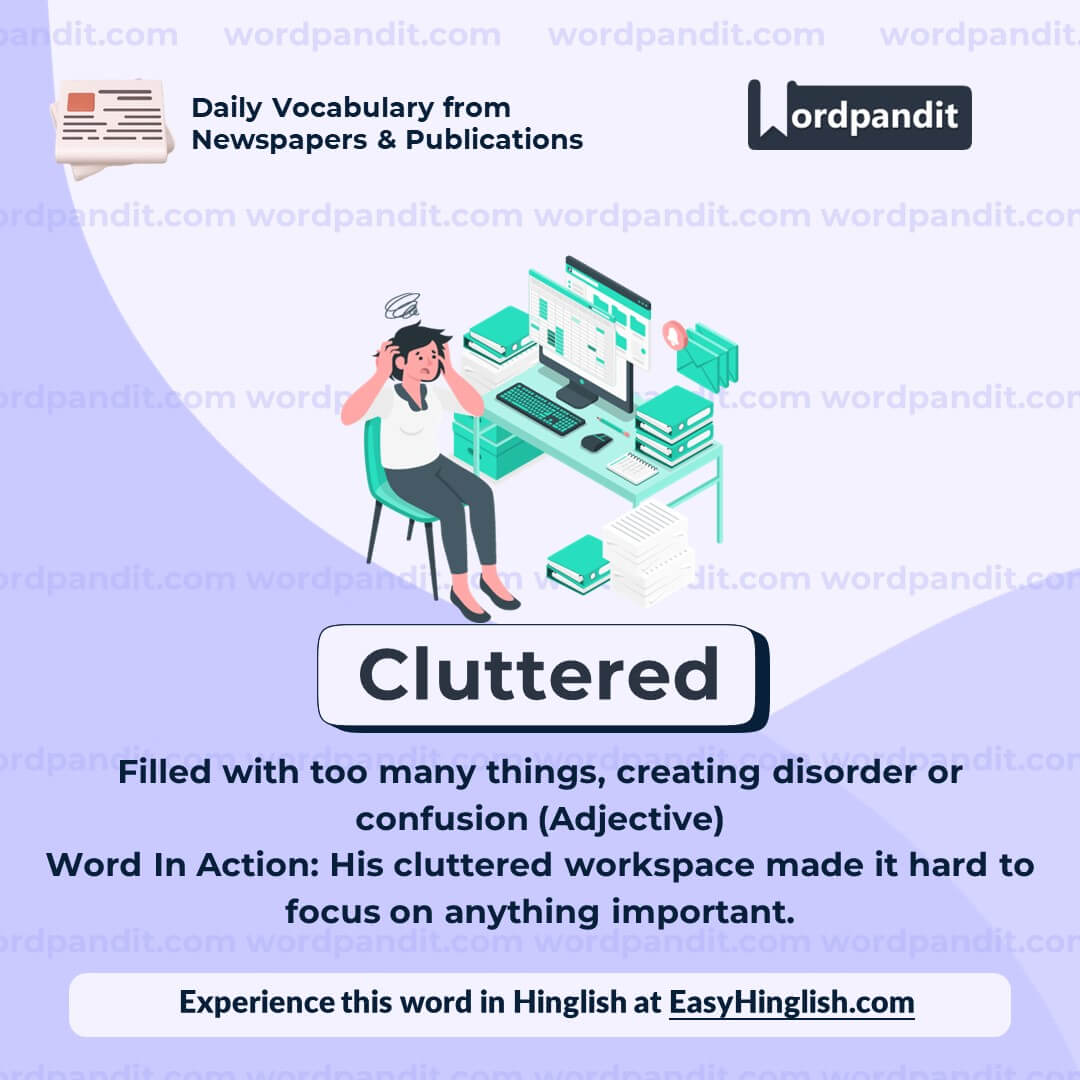Daily Vocabulary from International Newspapers and Publications
Expand Your Vocabulary with Wordpandit’s Global Vocabulary Hub
At Wordpandit, we are committed to helping you develop a truly global vocabulary by drawing from some of the most respected international publications. This section is designed to keep you ahead of the curve by introducing you to words that define global conversations and trends.
The Power of Global Sources
To help you think and communicate on a global scale, we curate vocabulary from renowned international sources, such as:
- The New York Times
- The Washington Post
- BBC
- The Guardian
- The Economist
- Scientific American
- Psychology Today
- And many more...
Stay Global, Stay Competitive
Our daily updates from international publications ensure you are consistently exposed to new words that reflect global news and developments, making sure your vocabulary is not only current but also globally relevant.
Enhance Your Global Perspective
Whether you’re preparing for international exams, aiming to excel in global business communication, or want to enhance your language skills for personal growth, Wordpandit offers the resources you need to thrive in a global context.
Effective Learning, Global Reach
Our learning methodology combines global examples, memory aids, and interactive activities, allowing you to internalize new words effectively and apply them in real-world scenarios.
Begin Your Global Vocabulary Journey Now!
Why Choose Wordpandit?
Practical Learning: Focus on words you'll actually encounter in real-world reading, enhancing your comprehension and communication skills.
Diverse Content: From current affairs to scientific breakthroughs, our varied sources expose you to vocabulary across multiple domains.
Effortless Integration: Make Wordpandit a part of your daily routine. Just a few minutes each day can significantly boost your lexicon over time.
Your Path to Vocabulary Mastery
- Visit our Daily Vocabulary section regularly
- Explore new words and their usage in context
- Practice incorporating these words into your own writing and speech
- Track your progress as your vocabulary expands
Start Your Journey Today
Embark on your vocabulary enhancement journey with Wordpandit. By consistently engaging with our daily posts, you'll build a robust vocabulary that serves you well in academic, professional, and personal contexts.
Remember, a word a day keeps linguistic limitations at bay. Make Wordpandit your daily companion in the quest for vocabulary excellence!
WORD-1: Prejudices
Context:
"The work was made between 2022 and 2023 and really highlighted the flaws and prejudices in source data, questioning the role of the internet in appropriation and stereotyping." - The Guardian
Explanatory Paragraph:
"Prejudices" refer to preconceived opinions or judgments that are not based on reason or actual experience. These biases can stem from cultural influences, misinformation, or personal experiences and often lead to unfair treatment of individuals or groups. Prejudices can exist in various forms, including racial, gender-based, religious, or social biases, and they can shape societal attitudes and behaviors.
Meaning: Unfounded or biased opinions, often negative, formed without sufficient knowledge or reason (Noun, plural of Prejudice).
Pronunciation: PREJ-uh-diss-iz
Difficulty Level: ⭐⭐⭐ Intermediate
Etymology: From Latin "praejudicium" (meaning 'prior judgment'), later adapted into Old French as "prejudice" and then into English.
Synonyms & Antonyms:
Synonyms: Bias, discrimination, intolerance, partiality, preconceived notion
Antonyms: Fairness, impartiality, open-mindedness, neutrality
Usage Examples:
- Many societal norms are shaped by long-standing prejudices that can be difficult to change.
- She fought against the prejudices in her workplace by advocating for equal opportunities.
- Prejudices can prevent people from seeing the true character of others.
- The documentary aimed to expose and challenge racial prejudices in the media.
Cultural Reference:
"Pride and Prejudice," a novel by Jane Austen, explores the themes of social class, first impressions, and personal biases, demonstrating how prejudices can affect relationships and societal expectations.
Think About It:
What are some ways individuals can overcome their own prejudices and develop a more open-minded perspective?
Quick Activity:
Think of a common stereotype or prejudice that exists in society. Write a short paragraph explaining why it is misleading and how it can be challenged.
Memory Tip:
Remember "prejudices" by breaking it into "pre" (before) + "judge" (form an opinion). It helps recall that prejudice means judging before knowing the facts.
Real-World Application:
Prejudices influence many aspects of society, from hiring decisions to social interactions. Awareness and education can help reduce biases and promote inclusivity in workplaces, schools, and communities.
WORD-2: Contaminate
Context:
"PFAS can stay in the environment for decades, contaminate water supplies and cause a variety of health issues." - BBC
Explanatory Paragraph:
"Contaminate" means to make something impure or harmful by adding unwanted or dangerous substances. It often refers to pollutants, toxins, or germs that enter air, water, food, or surfaces, making them unsafe. Contamination can have serious consequences for health and the environment, as seen in cases of polluted water sources or foodborne illnesses.
Meaning: To make something impure or harmful by introducing pollutants or unwanted substances (Verb).
Pronunciation: kun-TAM-uh-nate
Difficulty Level: ⭐⭐⭐ Intermediate
Etymology: From Latin "contaminare" (meaning 'to defile, corrupt'), later adopted into Middle English as "contaminate."
Synonyms & Antonyms:
Synonyms: Pollute, taint, infect, spoil, adulterate
Antonyms: Purify, cleanse, disinfect, decontaminate
Usage Examples:
- The factory's waste chemicals were found to contaminate the local river.
- Foodborne illnesses can spread when bacteria contaminate raw ingredients.
- Improper disposal of plastic can contaminate soil and harm wildlife.
- Scientists work hard to ensure that medical equipment does not get contaminated during production.
Cultural Reference:
The Chernobyl disaster in 1986 is one of history's most infamous cases of radioactive contamination, affecting the environment and human health for generations.
Think About It:
What are some ways individuals and governments can work together to reduce contamination in water and food sources?
Quick Activity:
Look around your home or school. Identify three things that could be sources of contamination and suggest how they can be managed safely.
Memory Tip:
Think of "contaminate" as "con + tamper"—when something is tampered with, it gets polluted or spoiled.
Real-World Application:
Contamination affects public health, from polluted drinking water to foodborne diseases. Efforts like waste management, water filtration, and hygiene education help prevent contamination in daily life.
WORD-3: Impressionistic
Context:
"These impressionistic images tapped into a psychological narrative that refreshed the veterans’ interpretations of conflict." - The Guardian
Explanatory Paragraph:
The word "impressionistic" describes something that is based on subjective feelings, perceptions, or general impressions rather than detailed accuracy or objective facts. It often refers to art, literature, or descriptions that evoke emotions and moods rather than providing precise details. The term originates from the Impressionist movement in painting, which focused on capturing light and atmosphere rather than realistic details.
Meaning: Relating to a broad, subjective impression rather than detailed accuracy (Adjective).
Pronunciation: im-PRESH-uh-NIS-tik
Difficulty Level: ⭐⭐⭐ Intermediate
Etymology: Derived from the French "impressionnisme," which originated from the Impressionist art movement of the 19th century.
Synonyms & Antonyms:
Synonyms: Vague, suggestive, atmospheric, evocative, expressive
Antonyms: Precise, detailed, realistic, factual, exact
Usage Examples:
- The artist's impressionistic style focused more on light and movement than on fine details.
- Her impressionistic recollection of the event lacked specific details but captured the overall mood.
- The novel's impressionistic descriptions of war emphasized emotions over exact historical accuracy.
- His review of the film was more impressionistic than analytical, highlighting how it made him feel rather than technical aspects.
Cultural Reference:
The Impressionist art movement, led by artists like Claude Monet and Edgar Degas, was known for its impressionistic paintings that used loose brushwork and vibrant colors to capture fleeting moments.
Think About It:
How does an impressionistic approach to storytelling differ from a factual or journalistic approach?
Quick Activity:
Look at a famous Impressionist painting (e.g., Monet's "Water Lilies") and describe it using impressionistic language, focusing on mood and feeling rather than exact details.
Memory Tip:
Think of "impressionistic" as creating an "impression" rather than a clear, factual picture—just like a blurry but emotional memory.
Real-World Application:
Impressionistic writing is often used in poetry, art criticism, and film reviews to convey emotions and atmosphere rather than technical details.
WORD-4: Upending
Context:
"However, as Moye explains, she’s not upending a tradition, but simply putting her own spin on pottery’s history as an accessible ‘folk language’ that’s rarely shied away from matters of sex." - Aeon
Explanatory Paragraph:
The word "upending" means overturning or disrupting something, often in a way that challenges established norms or expectations. It can refer to physically flipping something over or metaphorically shaking up traditions, beliefs, or systems. In the context of art, culture, or social structures, upending often implies innovation, rebellion, or redefining conventional ideas.
Meaning: To overturn, disrupt, or completely change something (Verb).
Pronunciation: up-EN-ding
Difficulty Level: ⭐⭐⭐ Intermediate
Etymology: From "up" (meaning upward) and "end" (to bring to an end, to turn over), first used in the 19th century.
Synonyms & Antonyms:
Synonyms: Overturn, disrupt, revolutionize, topple, unsettle
Antonyms: Stabilize, maintain, preserve, uphold
Usage Examples:
- The new technology is upending traditional business models.
- The political movement aimed at upending decades of corrupt leadership.
- By introducing unconventional ingredients, the chef is upending the way people think about traditional cuisine.
- The sudden economic crisis upended the global financial markets.
Cultural Reference:
The rise of streaming services like Netflix has upended the traditional television and film industry, changing how people consume entertainment.
Think About It:
What are some industries or traditions that have been upended by modern technology or social change?
Quick Activity:
Write a short paragraph about a time when a new idea or innovation upended a common way of doing things in your life or community.
Memory Tip:
Think of "upending" as literally flipping something "up" to its "end"—turning it upside down or changing it completely.
Real-World Application:
Upending is seen in various fields, from technology disrupting industries to social movements challenging outdated norms. Recognizing when change is happening can help individuals adapt and thrive in evolving environments.
WORD-5: Cluttered
Context:
"Telling her story from the cluttered yurt in the Bulgarian countryside that she now calls home, Irvine explains why, throughout her life, she has chosen unconventional paths as a means of protecting herself from feeling overwhelmed by a modern world she saw as imbued with too many prescriptions and, indeed, too many choices." - Psyche
Explanatory Paragraph:
The word "cluttered" describes a space or situation that is messy, chaotic, or filled with too many things. It often conveys a sense of disorder, whether it refers to a physical environment, like a cluttered desk, or a mental state, like a cluttered mind overwhelmed with too many thoughts. Clutter can result from an excess of objects, ideas, or distractions, making it difficult to focus or navigate efficiently.
Meaning: Filled with too many things, creating disorder or confusion (Adjective).
Pronunciation: KLUT-terd
Difficulty Level: ⭐⭐ Beginner
Etymology: Derived from Middle English "clotteren," meaning "to coagulate or form lumps," later evolving to describe a messy or disorganized state.
Synonyms & Antonyms:
Synonyms: Messy, chaotic, disorganized, jumbled, crowded
Antonyms: Tidy, organized, neat, streamlined, orderly
Usage Examples:
- Her desk was so cluttered with papers that she struggled to find her notebook.
- My thoughts felt cluttered after a long day of multitasking.
- The cluttered streets of the old market were full of vendors, shoppers, and colorful displays.
- He decided to declutter his home after realizing how much the cluttered space was affecting his focus.
Cultural Reference:
The popularity of minimalism, inspired by figures like Marie Kondo, emphasizes the benefits of decluttering both physical spaces and mental states for a more peaceful and intentional life.
Think About It:
How does a cluttered environment impact your ability to focus and think clearly?
Quick Activity:
Look at your workspace or room. Identify three items that contribute to clutter and find a way to organize or remove them.
Memory Tip:
Think of "cluttered" as "clustered with stuff"—too many things packed together in a messy way.
Real-World Application:
Cluttered spaces can increase stress and reduce productivity. Organizing living and work areas can lead to better mental well-being and efficiency.



